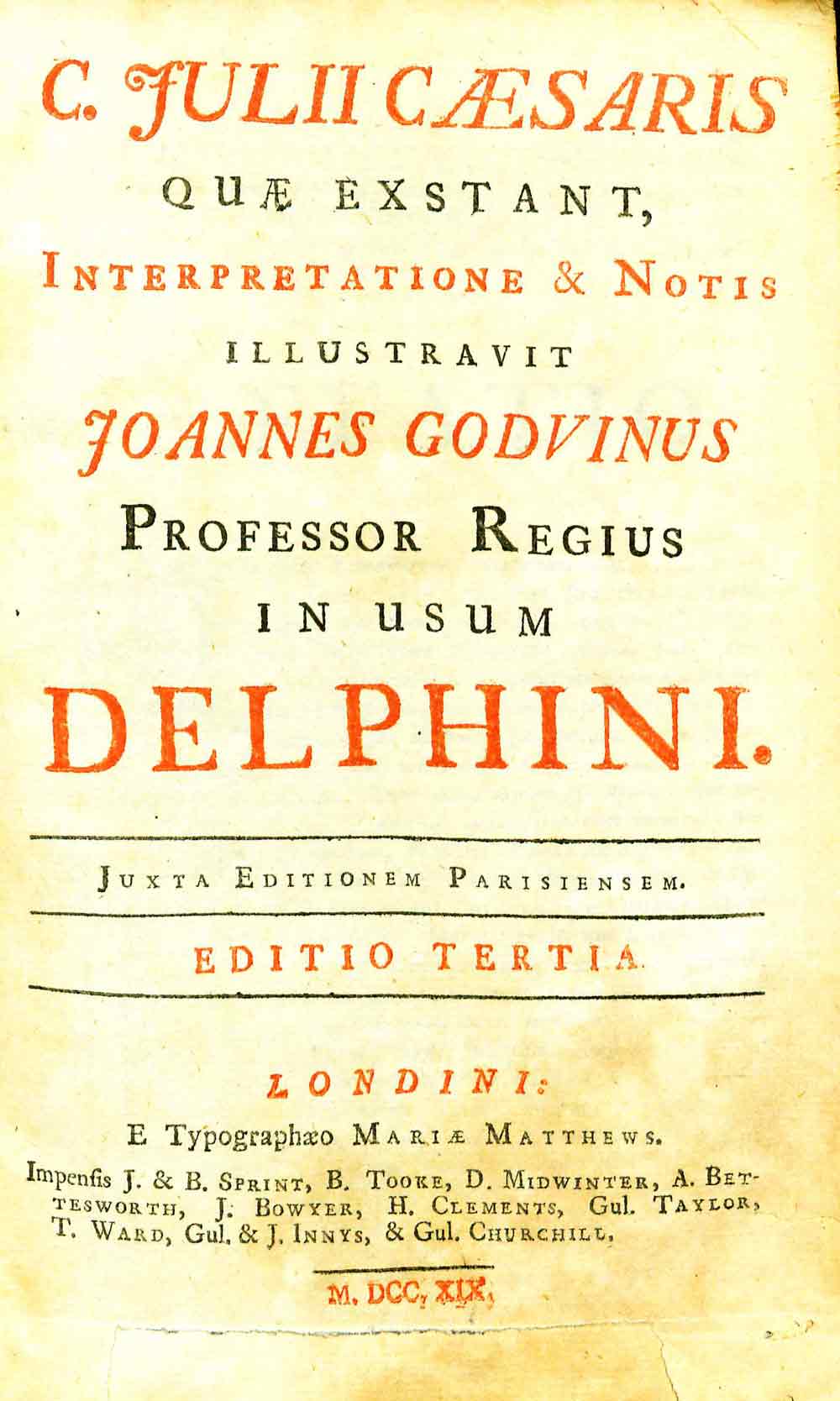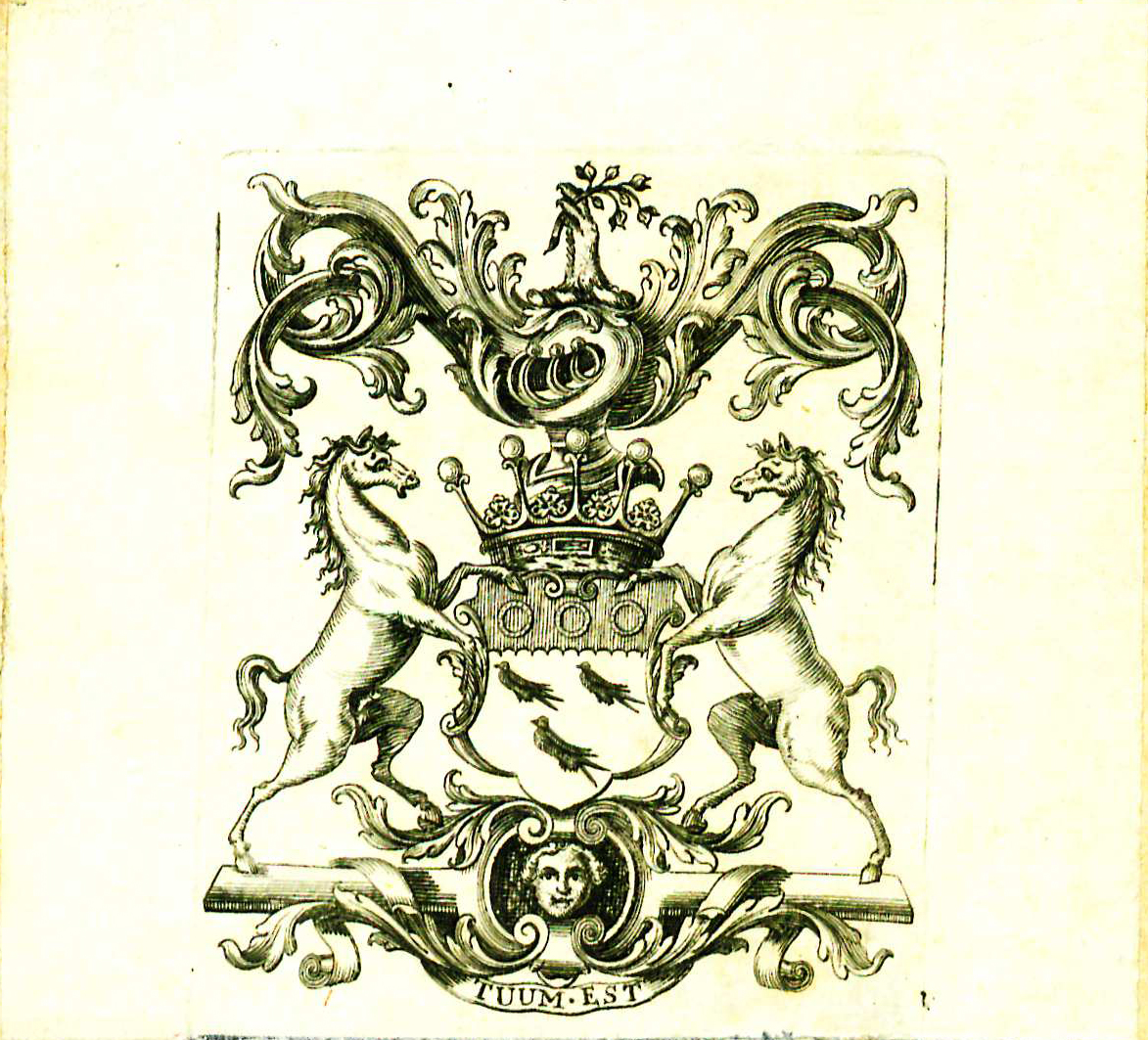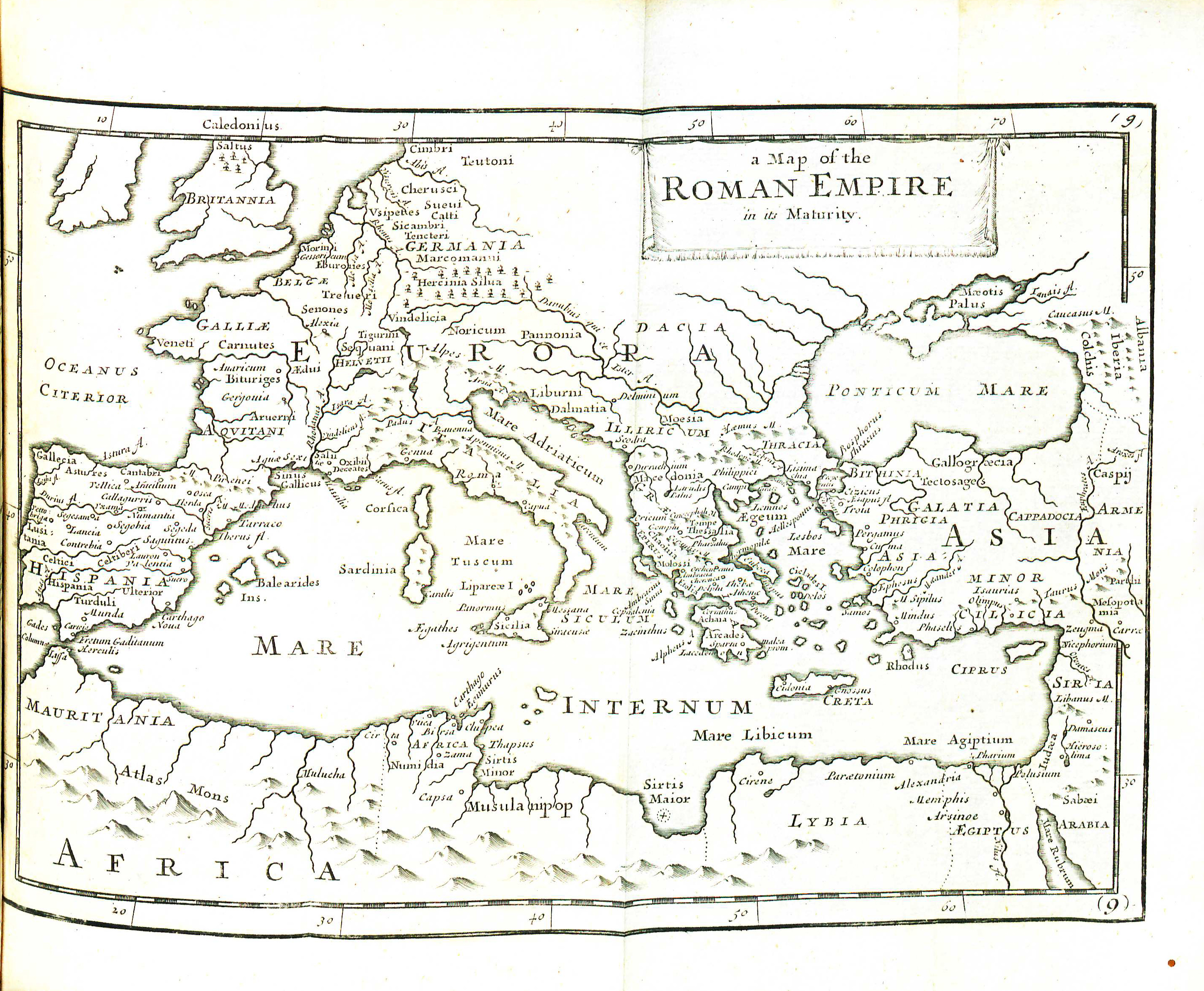Difference between revisions of "C. Julii Caesaris Quae Exstant"
m |
|||
| (16 intermediate revisions by 7 users not shown) | |||
| Line 4: | Line 4: | ||
{{BookPageInfoBox | {{BookPageInfoBox | ||
|imagename=CaesarCJuliiCaesaris1719.jpg | |imagename=CaesarCJuliiCaesaris1719.jpg | ||
| − | |link=https:// | + | |link=https://wm.primo.exlibrisgroup.com/permalink/01COWM_INST/g9pr7p/alma991021469269703196 |
|shorttitle=C. Julii Caesaris Quae Exstant | |shorttitle=C. Julii Caesaris Quae Exstant | ||
| − | |author=Julius Caesar | + | |author=[[:Category:Julius Caesar|Julius Caesar]] |
| − | |publoc=Londini | + | |publoc=[[:Category:London|Londini]] |
|publisher= E [sic] typographaeo Mariae Matthews : Impensis J. & B. Sprint, B. Tooke, D. Midwinter, A. Bettesworth, J. Bowyer, H. Clements, Gul. Taylor, T. Ward, Gul. & J. Innys, & Gul. Churchill | |publisher= E [sic] typographaeo Mariae Matthews : Impensis J. & B. Sprint, B. Tooke, D. Midwinter, A. Bettesworth, J. Bowyer, H. Clements, Gul. Taylor, T. Ward, Gul. & J. Innys, & Gul. Churchill | ||
|year=1719 | |year=1719 | ||
| − | |editor=Joannes Godvinus | + | |editor=[[:Category:Joannes Godvinus|Joannes Godvinus]] |
|edition=Edition tertia | |edition=Edition tertia | ||
| − | |lang=Latin | + | |lang=[[:Category:Latin|Latin]] |
|pages=[8], 490, [166] | |pages=[8], 490, [166] | ||
| − | |desc=8vo (20 cm.) | + | |desc=[[:Category:Octavos|8vo]] (20 cm.) |
| + | |shelf=I-4 | ||
}}{{BookPageBookplate | }}{{BookPageBookplate | ||
|imagename=CJuliiCaesarisQuaeExstant1719Bookplate.jpg | |imagename=CJuliiCaesarisQuaeExstant1719Bookplate.jpg | ||
|display=left | |display=left | ||
|caption=Armorial bookplate, front pastedown. | |caption=Armorial bookplate, front pastedown. | ||
| − | }}[http://en.wikipedia.org/wiki/Julius_Caesar Gaius Iulius Caesar] (100 BCE-44 BCE) was born into one of the highest social, yet relatively politically unimportant, families of Rome. Throughout his life, Caesar married daughters of high-ranking men in order to gain political and social power. He was a successful military general and a convincing (albeit not always successful) Attic orator who | + | }}[http://en.wikipedia.org/wiki/Julius_Caesar Gaius Iulius Caesar] (100 BCE-44 BCE) was born into one of the highest social, yet relatively politically unimportant, families of Rome. Throughout his life, Caesar married daughters of high-ranking men in order to gain political and social power. He was a successful military general and a convincing (albeit not always successful) [http://en.wikipedia.org/wiki/Attic_Greek Attic] orator who used bribes, threats and a multitude of friendships and connections to exact revenge and to rise up the ranks of the politically powerful in Rome. Given control by the Senate of three large regions of what would be Europe, Caesar started, and finished, a [http://en.wikipedia.org/wiki/Gallic_Wars major war] in [http://en.wikipedia.org/wiki/Gaul Gaul] that vastly increased his influence over the Roman people while simultaneously solidifying his enemies’ positions against him. To escape conviction and exile, Caesar “crossed the Rubicon” in 49BCE with his army and invaded Italy, starting a [http://en.wikipedia.org/wiki/Caesar%27s_Civil_War civil war] that spread throughout the Roman Empire. After his victory, Caesar enjoyed a variety of high political positions from 49 to 45 BCE before finally naming himself [http://en.wikipedia.org/wiki/Dictator_perpetuo ''dictator perpetuo''] (perpetual dictator) in 44BCE. On the [http://en.wikipedia.org/wiki/Ides_of_March “Ides of March,”] 15 March 44 BCE, Caesar was assassinated in a widespread conspiracy to take him out of power. Caesar adopted his great-nephew [http://en.wikipedia.org/wiki/Augustus Octavian], who would become the first Roman “emperor” Augustus, posthumously through his will.<ref>"[http://www.oxfordreference.com/view/10.1093/acref/9780192801463.001.0001/acref-9780192801463-e-1173 Iūlius Caesar]" in ''Oxford Dictionary of the Classical World'', ed. John Roberts (Oxford: Oxford University Press, 2007).</ref><br /> |
| − | <br />This 1719 compilation of Julius Caesar’s works includes his most famous war commentaries in the original Latin | + | <br />This 1719 compilation of Julius Caesar’s works includes his most famous war commentaries in the original Latin: ''De Bello Gallico'', ''De Bello Civili'', ''De Bello Alexandrino'', ''De Bello Africano'', and ''De Bello Hispaniensi''. Caesar relates his role and memories from these wars in Gaul, the Roman Empire (Civil War), Greece, Africa, and Spain, respectively. Also included are fragments of Caesar’s histories (in progress at his death), fragments from letters he wrote and received, and an index, ''Index Vocabulorum Omnium'', of all the vocabulary used in the works. |
[[File:CJuliiCaesarisQuaeExstant1719Map.jpg|left|thumb|300px|<center>Map of Roman Empire.</center>]] | [[File:CJuliiCaesarisQuaeExstant1719Map.jpg|left|thumb|300px|<center>Map of Roman Empire.</center>]] | ||
==Evidence for Inclusion in Wythe's Library== | ==Evidence for Inclusion in Wythe's Library== | ||
| − | Listed in the [[Jefferson Inventory]] of [[Wythe's Library]] as | + | Listed in the [[Jefferson Inventory]] of [[Wythe's Library]] as "Caesar Delphini. 8vo." and given by [[Thomas Jefferson]] to his grandson [[Thomas Jefferson Randolph]]. The precise edition owned by Wythe is unknown. [http://www.librarything.com/profile/GeorgeWythe George Wythe's Library]<ref>''LibraryThing'', s.v. "[http://www.librarything.com/profile/GeorgeWythe Member: George Wythe]," accessed on November 13, 2013.</ref> on LibraryThing indicates this adding "Several octavo editions were published, the first in 1693." The [https://digitalarchive.wm.edu/handle/10288/13433 Brown Bibliography]<ref>Bennie Brown, "The Library of George Wythe of Williamsburg and Richmond," (unpublished manuscript, May, 2012) Microsoft Word file. Earlier edition available at: https://digitalarchive.wm.edu/handle/10288/13433.</ref> lists the London third edition published in 1719 based on the copy Jefferson sold to the Library of Congress.<ref>E. Millicent Sowerby, ''Catalogue of the Library of Thomas Jefferson'', (Washington, D.C.: The Library of Congress, 1952-1959), 1:28-29 [http://babel.hathitrust.org/cgi/pt?id=mdp.39015033648091;view=1up;seq=59 [no.59]].</ref> The Wolf Law Library followed Brown's suggestion and purchased the third edition edited by Joannes Godvinus. |
==Description of the Wolf Law Library's copy== | ==Description of the Wolf Law Library's copy== | ||
Bound in octavo calf, covers blind tooled. Spine features five raised bands with gilt compartments and spine label. Book edges are sprinkled red and brown. The front pastedown includes an armorial bookplate with the name removed. Purchased from Abbey Antiquarian Books. | Bound in octavo calf, covers blind tooled. Spine features five raised bands with gilt compartments and spine label. Book edges are sprinkled red and brown. The front pastedown includes an armorial bookplate with the name removed. Purchased from Abbey Antiquarian Books. | ||
| − | View this book in [https:// | + | Images of the library's copy of this book are [https://www.flickr.com/photos/wolflawlibrary/albums/72157637634117756 available on Flickr.] View the record for this book in [https://wm.primo.exlibrisgroup.com/permalink/01COWM_INST/g9pr7p/alma991021469269703196 William & Mary's online catalog.] |
| + | |||
| + | ==See also== | ||
| + | *''[[Caii Julii Caesaris et A. Hirtii de Rebus a Caesare Gestis Commentarii]]'' | ||
| + | *[[George Wythe Room]] | ||
| + | *[[Jefferson Inventory]] | ||
| + | *[[Wythe's Library]] | ||
| + | |||
==References== | ==References== | ||
<references/> | <references/> | ||
| Line 34: | Line 42: | ||
[[Category:Ancient History]] | [[Category:Ancient History]] | ||
[[Category:George Wythe Collection at William & Mary's Wolf Law Library]] | [[Category:George Wythe Collection at William & Mary's Wolf Law Library]] | ||
| + | [[Category:Julius Caesar]] | ||
| + | [[Category:Thomas Jefferson Randolph's Books]] | ||
[[Category:Titles in Wythe's Library]] | [[Category:Titles in Wythe's Library]] | ||
| + | |||
| + | [[Category:Latin]] | ||
| + | [[Category:London]] | ||
| + | [[Category:Octavos]] | ||
| + | [[Category:Joannes Godvinus]] | ||
Latest revision as of 09:26, 1 May 2024
by Julius Caesar
| C. Julii Caesaris Quae Exstant | |
|
Title page from C. Julii Caesaris Quae Exstant, George Wythe Collection, Wolf Law Library, College of William & Mary. | |
| Author | Julius Caesar |
| Editor | Joannes Godvinus |
| Published | Londini: E [sic] typographaeo Mariae Matthews : Impensis J. & B. Sprint, B. Tooke, D. Midwinter, A. Bettesworth, J. Bowyer, H. Clements, Gul. Taylor, T. Ward, Gul. & J. Innys, & Gul. Churchill |
| Date | 1719 |
| Edition | Edition tertia |
| Language | Latin |
| Pages | [8], 490, [166] |
| Desc. | 8vo (20 cm.) |
| Location | Shelf I-4 |
Gaius Iulius Caesar (100 BCE-44 BCE) was born into one of the highest social, yet relatively politically unimportant, families of Rome. Throughout his life, Caesar married daughters of high-ranking men in order to gain political and social power. He was a successful military general and a convincing (albeit not always successful) Attic orator who used bribes, threats and a multitude of friendships and connections to exact revenge and to rise up the ranks of the politically powerful in Rome. Given control by the Senate of three large regions of what would be Europe, Caesar started, and finished, a major war in Gaul that vastly increased his influence over the Roman people while simultaneously solidifying his enemies’ positions against him. To escape conviction and exile, Caesar “crossed the Rubicon” in 49BCE with his army and invaded Italy, starting a civil war that spread throughout the Roman Empire. After his victory, Caesar enjoyed a variety of high political positions from 49 to 45 BCE before finally naming himself dictator perpetuo (perpetual dictator) in 44BCE. On the “Ides of March,” 15 March 44 BCE, Caesar was assassinated in a widespread conspiracy to take him out of power. Caesar adopted his great-nephew Octavian, who would become the first Roman “emperor” Augustus, posthumously through his will.[1]
This 1719 compilation of Julius Caesar’s works includes his most famous war commentaries in the original Latin: De Bello Gallico, De Bello Civili, De Bello Alexandrino, De Bello Africano, and De Bello Hispaniensi. Caesar relates his role and memories from these wars in Gaul, the Roman Empire (Civil War), Greece, Africa, and Spain, respectively. Also included are fragments of Caesar’s histories (in progress at his death), fragments from letters he wrote and received, and an index, Index Vocabulorum Omnium, of all the vocabulary used in the works.
Evidence for Inclusion in Wythe's Library
Listed in the Jefferson Inventory of Wythe's Library as "Caesar Delphini. 8vo." and given by Thomas Jefferson to his grandson Thomas Jefferson Randolph. The precise edition owned by Wythe is unknown. George Wythe's Library[2] on LibraryThing indicates this adding "Several octavo editions were published, the first in 1693." The Brown Bibliography[3] lists the London third edition published in 1719 based on the copy Jefferson sold to the Library of Congress.[4] The Wolf Law Library followed Brown's suggestion and purchased the third edition edited by Joannes Godvinus.
Description of the Wolf Law Library's copy
Bound in octavo calf, covers blind tooled. Spine features five raised bands with gilt compartments and spine label. Book edges are sprinkled red and brown. The front pastedown includes an armorial bookplate with the name removed. Purchased from Abbey Antiquarian Books.
Images of the library's copy of this book are available on Flickr. View the record for this book in William & Mary's online catalog.
See also
- Caii Julii Caesaris et A. Hirtii de Rebus a Caesare Gestis Commentarii
- George Wythe Room
- Jefferson Inventory
- Wythe's Library
References
- ↑ "Iūlius Caesar" in Oxford Dictionary of the Classical World, ed. John Roberts (Oxford: Oxford University Press, 2007).
- ↑ LibraryThing, s.v. "Member: George Wythe," accessed on November 13, 2013.
- ↑ Bennie Brown, "The Library of George Wythe of Williamsburg and Richmond," (unpublished manuscript, May, 2012) Microsoft Word file. Earlier edition available at: https://digitalarchive.wm.edu/handle/10288/13433.
- ↑ E. Millicent Sowerby, Catalogue of the Library of Thomas Jefferson, (Washington, D.C.: The Library of Congress, 1952-1959), 1:28-29 [no.59].


